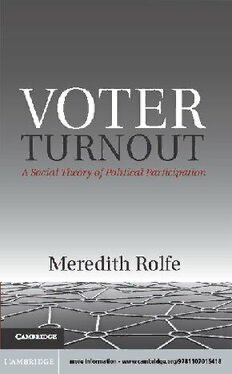
Voter Turnout: A Social Theory of Political Participation PDF
Preview Voter Turnout: A Social Theory of Political Participation
Voter Turnout This book develops and empirically tests a social theory of political participation. It overturns prior understandings of why some people (such as college-degree holders, churchgoers, and citizens in national rather than local elections) vote more often than others. The book shows that the standard demographic variables are not proxies for var- iation in the individual costs and benefits of participation, but for sys- tematic variation in the patterns of social ties between potential voters. Potential voters who move in larger social circles, particularly those including politicians and other mobilizing political actors, have more access to the flurry of electoral activity prodding citizens to vote and increasing political discussion. Treating voting as a socially defined practice instead of as an indi- vidual choice over personal payoffs, a social theory of participation is derived from a mathematical model with behavioral foundations. The model of turnout is empirically calibrated and tested using multiple methods and data sources. Meredith Rolfe is a Fellow in the Management Department at the London School of Economics. Prior to joining LSE, she held a Postdoctoral Prize Research Fellowship at Nuffield College, Oxford, and was a Senior Research Fellow at Saïd Business School, Oxford. Dr. Rolfe holds a PhD in Political Science from the University of Chicago, and her dissertation was awarded the Mancur Olson Dissertation Prize by the APSA Political Economy organised section. Her research has been funded by the National Science Foundation, the British Academy, Oxford’s John Fell Fund, the EU-sponsored EqualSOC Framework, and the Oxford University Centre of Corporation Reputation. Her work has appeared in Public Opinion Quarterly and L’Année Sociologique, and she was an invited contributor to the Oxford Handbook of Analytical Sociology and the Oxford Handbook of Corporate Reputation. Political Economy of Institutions and Decisions Series Editors Stephen Ansolabehere, Harvard University Jeffry Frieden, Harvard University Founding Editors James E. Alt, Harvard University Douglass C. North, Washington University of St. Louis Other Books in the Series Alberto Alesina and Howard Rosenthal, Partisan Politics, Divided Government and the Economy Lee J. Alston, Thrainn Eggertsson, and Douglass C. North, eds., Empirical Studies in Institutional Change Lee J. Alston and Joseph P. Ferrie, Southern Paternalism and the Rise of the American Welfare State: Economics, Politics, and Institutions, 1865–1965 James E. Alt and Kenneth Shepsle, eds., Perspectives on Positive Political Economy Josephine T. Andrews, When Majorities Fail: The Russian Parliament, 1990–1993 Jeffrey S. Banks and Eric A. Hanushek, eds., Modern Political Economy: Old Topics, New Directions Yoram Barzel, Economic Analysis of Property Rights, 2nd edition Yoram Barzel, A Theory of the State: Economic Rights, Legal Rights, and the Scope of the State Robert Bates, Beyond the Miracle of the Market: The Political Economy of Agrarian Development in Kenya, 2nd edition Jenna Bednar, The Robust Federation: Principles of Design Charles M. Cameron, Veto Bargaining: Presidents and the Politics of Negative Power Kelly H. Chang, Appointing Central Bankers: The Politics of Monetary Policy in the United States and the European Monetary Union Peter Cowhey and Mathew McCubbins, eds., Structure and Policy in Japan and the United States: An Institutionalist Approach (continued after Index) Voter Turnout A Social Theory of Political Participation MErEDITh rolfE London School of Economics cambridge university press Cambridge, New York, Melbourne, Madrid, Cape Town, Singapore, São Paulo, Delhi, Mexico City Cambridge University Press 32 Avenue of the Americas, New York, ny 10013-2473, usa www.cambridge.org Information on this title: www.cambridge.org/9781107015418 © Meredith Rolfe 2012 This publication is in copyright. Subject to statutory exception and to the provisions of relevant collective licensing agreements, no reproduction of any part may take place without the written permission of Cambridge University Press. First published 2012 Printed in the United States of America A catalog record for this publication is available from the British Library. Library of Congress Cataloging in Publication data Rolfe, Meredith, 1971– Voter turnout : a social theory of political participation / Meredith Rolfe. p. cm. Includes bibliographical references and index. isbn 978-1-107-01541-8 (hardback) 1. Voting – Social aspects. 2. Political participation – Social aspects. 3. Voting – Social aspects – United States. 4. Political participation – Social aspects – United States. I. Title. jf1001.r55 2012 324.601–dc23 2011025902 isbn 978-1-107-01541-8 Hardback Cambridge University Press has no responsibility for the persistence or accuracy of urls for external or third-party Internet Web sites referred to in this publication and does not guarantee that any content on such Web sites is, or will remain, accurate or appropriate. This book is dedicated to my grandfather, Curry, and to the memory of my grandparents, Audrey, Lalla, and Shelley. All four were (and are) politically active citizens who brought out the best in those around them, although only one had a college degree. Why talk about social decision-making? Isn’t it enough to talk about individual decision-making? Why do we need social decision making at all? Today there is abroad the land the libertarian delu- sion that individuals are some sort of Leibnizian monads . . . each with a consistent independent utility function and each interacting with its fellows only through its knowledge of market prices. Not so. We are not monads because, among many other reasons, our values, the alternatives of action that we are aware of, our under- standing of what consequences may flow from our actions – all this knowledge, all these preferences – derive from our interaction with our social environment. Some of our values and knowledge were sucked in with our mother’s milk; others were taken, often quite uncritically, from our social environment. Still others, perhaps were acquired by reacting against that environment, but few indeed, surely, in complete independence of it. – Herbert Simon, 1983 Reason
